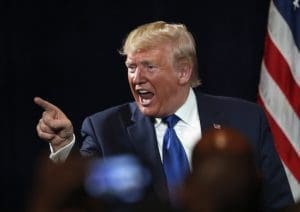Trump's TikTok deal is about power, experts say — not national security
Experts see Trump’s threats as a thinly veiled bid for control in an ongoing global trade tug-of-war.

Trump’s threats against TikTok were never about national security, experts say. It was always about power.
The outlook for TikTok and WeChat was bleak in the United States last week, as Trump’s threatened ban on the Chinese apps loomed.
Then Saturday, Trump unexpectedly signed off on the formation of TikTok Global, a new entity jointly operated by Oracle and Walmart and hosted in the United States, effectively brokering a deal to give the United States a financial stake in the wildly successful social media platform.
In this arrangement, TikTok would pay $5 billion in tax dollars to the U.S. Treasury.
On Monday, Chinese company ByteDance said it would retain the majority share — 80% — of the company until next year, throwing a wrench in the works.
Trump said Monday on Fox & Friends that “the Chinese firm would have nothing to do with it, and if they do, we just won’t make the deal.”
He added that if the American companies do not retain control of the app and keep data in the United States, then he won’t approve it.
But the government hasn’t laid out any substantive evidence that these apps pose a serious security risk, and many foreign policy analysts consider the move to be simply a power play by the White House to wrest control from China in a global economy tug-of-war.
Trump’s hypocrisy is evident, as he showed little concern over the 2018 Facebook data breach scandal, which exposed Cambridge Analytica — a Trump-linked firm that worked with his campaign during the 2016 election and the U.K. Leave campaign — for harvesting data from more than 87 million Facebook users.
It is also worth noting that Trump only warmed up to the TikTok deal once Oracle, a tech giant with close ties to his administration, got on board.
Kirsten Martin, professor of technology ethics at the University of Notre Dame, told NPR that this deal doesn’t actually resolve any of Trump’s supposed national security concerns about the Chinese apps.
“TikTok never had U.S. user data on Chinese soil,” she said. “So this deal is moving the data from one U.S. company to another? I don’t see how that materially changes anything.”
Former Facebook Chief Security Officer Alex Stamos tweeted that “a deal where Oracle takes over hosting” without significant operational changes “would not address any of the legitimate concerns about TikTok, and the White House accepting such a deal would demonstrate that this exercise was pure grift.”
While national security may not be at stake, it’s clear that political expedience — and global power in a trade war — is.
As early as August, during the 2020 Republican National Convention, the GOP was casting China as public enemy no. 1, with former U.N. Ambassador Nikki Haley blaming the coronavirus crisis on “Communist China” and Secretary of State Mike Pompeo promising that jobs would be “coming home” from China on the second day of the convention.
As Carl Tobias, a law professor at the University of Richmond, told the New York Times, “There’s no there there. Is this really about trade, or about the political benefit of trying to bash China and show how tough the administration can be?”
Moreover, the TikTok ban appears to be part of a bigger Trump administration push against Chinese tech. Trump has waged an ongoing battle with Chinese tech giant Huawei in the past, for instance, claiming it possesses a way to extract data and poses a national security threat. The technology company’s founder has denied all claims of sharing secrets with the Chinese government.
Trump’s most recent export controls on Huawei mean that without a license, the company’s non-U.S. suppliers cannot ship to Huawei if the product contains any American technology. This crackdown is poised to cause major problems throughout the technology industry.
And a directive last spring from the White House restricted utilities companies from buying power-grid equipment from foreign adversaries like China and Russia, potentially causing mass upheaval since most of the United States’s electrical equipment is purchased overseas.
Andy Green, vice president of technology policy, told the American Independent Foundation that Trump’s motivations in the TikTok deal are suspect.
“As with most things in the Trump administration, legitimate issues around TikTok like security and privacy take a backseat to a corrupt and incoherent process that just happens to reward some of his biggest political supporters,” Green said.
And, he noted, if TikTok posed a legitimate security threat to the American people, the administration badly botched its response.
“Shakedowns aren’t a serious way for presidents to address the threats posed by Chinese technology companies,” Green added.
Published with permission of The American Independent Foundation.
Recommended

Biden calls for expanded child tax credit, taxes on wealthy in $7.2 trillion budget plan
President Joe Biden released his budget request for the upcoming fiscal year Monday, calling on Congress to stick to the spending agreement brokered last year and to revamp tax laws so that the “wealthy pay their fair share.”
By Jennifer Shutt, States Newsroom - March 11, 2024
December jobs report: Wages up, hiring steady as job market ends year strong
Friday’s jobs data showed a strong, resilient U.S. labor market with wages outpacing inflation — welcome news for Americans hoping to have more purchasing power in 2024.
By Casey Quinlan - January 05, 2024
Biden’s infrastructure law is boosting Nevada’s economy. Sam Brown opposed it.
The Nevada Republican U.S. Senate hopeful also spoke out against a rail project projected to create thousands of union jobs
By Jesse Valentine - November 15, 2023








































































